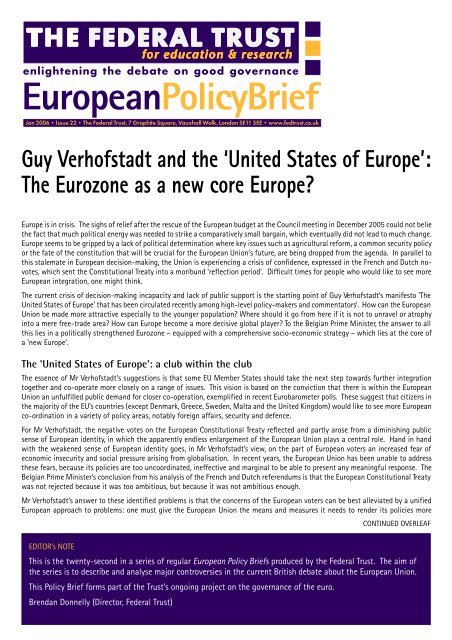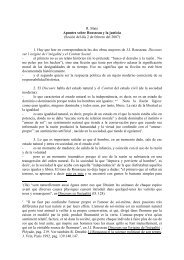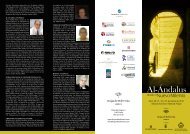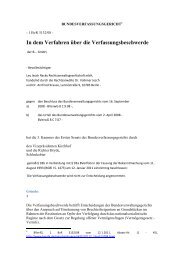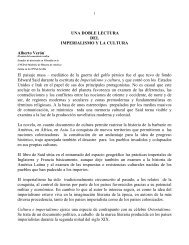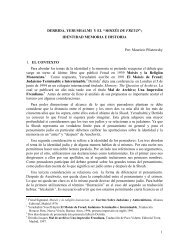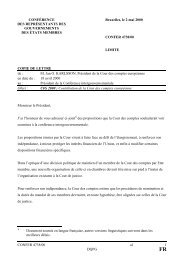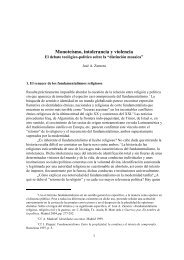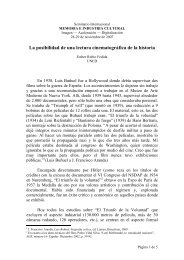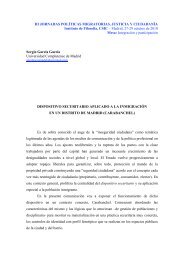Guy Verhofstadt and 'The United States of Europe'
Guy Verhofstadt and 'The United States of Europe'
Guy Verhofstadt and 'The United States of Europe'
- No tags were found...
You also want an ePaper? Increase the reach of your titles
YUMPU automatically turns print PDFs into web optimized ePapers that Google loves.
THEFEDERAL TRUSTfor education & researchenlightening the debate on good governanceEuropeanPolicyBriefJan 2006 • Issue 22 • The Federal Trust, 7 Graphite Square, Vauxhall Walk, London SE11 5EE • www.fedtrust.co.uk<strong>Guy</strong> <strong>Verh<strong>of</strong>stadt</strong> <strong>and</strong> the ‘<strong>United</strong> <strong>States</strong> <strong>of</strong> Europe’:The Eurozone as a new core Europe?Europe is in crisis. The sighs <strong>of</strong> relief after the rescue <strong>of</strong> the European budget at the Council meeting in December 2005 could not beliethe fact that much political energy was needed to strike a comparatively small bargain, which eventually did not lead to much change.Europe seems to be gripped by a lack <strong>of</strong> political determination where key issues such as agricultural reform, a common security policyor the fate <strong>of</strong> the constitution that will be crucial for the European Union's future, are being dropped from the agenda. In parallel tothis stalemate in European decision-making, the Union is experiencing a crisis <strong>of</strong> confidence, expressed in the French <strong>and</strong> Dutch novotes,which sent the Constitutional Treaty into a moribund 'reflection period'. Difficult times for people who would like to see moreEuropean integration, one might think.The current crisis <strong>of</strong> decision-making incapacity <strong>and</strong> lack <strong>of</strong> public support is the starting point <strong>of</strong> <strong>Guy</strong> <strong>Verh<strong>of</strong>stadt</strong>’s manifesto <strong>'The</strong><strong>United</strong> <strong>States</strong> <strong>of</strong> <strong>Europe'</strong> that has been circulated recently among high-level policy-makers <strong>and</strong> commentators 1 . How can the EuropeanUnion be made more attractive especially to the younger population? Where should it go from here if it is not to unravel or atrophyinto a mere free-trade area? How can Europe become a more decisive global player? To the Belgian Prime Minister, the answer to allthis lies in a politically strengthened Eurozone – equipped with a comprehensive socio-economic strategy – which lies at the core <strong>of</strong>a 'new <strong>Europe'</strong>.The '<strong>United</strong> <strong>States</strong> <strong>of</strong> <strong>Europe'</strong>: a club within the clubThe essence <strong>of</strong> Mr <strong>Verh<strong>of</strong>stadt</strong>'s suggestions is that some EU Member <strong>States</strong> should take the next step towards further integrationtogether <strong>and</strong> co-operate more closely on a range <strong>of</strong> issues. This vision is based on the conviction that there is within the EuropeanUnion an unfulfilled public dem<strong>and</strong> for closer co-operation, exemplified in recent Eurobarometer polls. These suggest that citizens inthe majority <strong>of</strong> the EU’s countries (except Denmark, Greece, Sweden, Malta <strong>and</strong> the <strong>United</strong> Kingdom) would like to see more Europeanco-ordination in a variety <strong>of</strong> policy areas, notably foreign affairs, security <strong>and</strong> defence.For Mr <strong>Verh<strong>of</strong>stadt</strong>, the negative votes on the European Constitutional Treaty reflected <strong>and</strong> partly arose from a diminishing publicsense <strong>of</strong> European identity, in which the apparently endless enlargement <strong>of</strong> the European Union plays a central role. H<strong>and</strong> in h<strong>and</strong>with the weakened sense <strong>of</strong> European identity goes, in Mr <strong>Verh<strong>of</strong>stadt</strong>’s view, on the part <strong>of</strong> European voters an increased fear <strong>of</strong>economic insecurity <strong>and</strong> social pressure arising from globalisation. In recent years, the European Union has been unable to addressthese fears, because its policies are too uncoordinated, ineffective <strong>and</strong> marginal to be able to present any meaningful response. TheBelgian Prime Minister’s conclusion from his analysis <strong>of</strong> the French <strong>and</strong> Dutch referendums is that the European Constitutional Treatywas not rejected because it was too ambitious, but because it was not ambitious enough.Mr <strong>Verh<strong>of</strong>stadt</strong>’s answer to these identified problems is that the concerns <strong>of</strong> the European voters can be best alleviated by a unifiedEuropean approach to problems: one must give the European Union the means <strong>and</strong> measures it needs to render its policies moreCONTINUED OVERLEAFEDITOR’s NOTEThis is the twenty-second in a series <strong>of</strong> regular European Policy Briefs produced by the Federal Trust. The aim <strong>of</strong>the series is to describe <strong>and</strong> analyse major controversies in the current British debate about the European Union.This Policy Brief forms part <strong>of</strong> the Trust’s ongoing project on the governance <strong>of</strong> the euro.Brendan Donnelly (Director, Federal Trust)
efficient <strong>and</strong> to make the Union moreattractive by being capable to respond toits citizens' dem<strong>and</strong>s. Like many before him,Mr <strong>Verh<strong>of</strong>stadt</strong> draws inspiration from theexperience <strong>of</strong> the <strong>United</strong> <strong>States</strong> <strong>of</strong> America.The birth <strong>of</strong> a federal structure with acommon budget <strong>and</strong> a constitution proveddifficult <strong>and</strong> slow at the beginning, butgained pace as problems mounted thatcould only be dealt with properly at thefederal level.However, the Prime Minister realises at thesame time that a substantially moreintegrated European Union might not beaccepted by all <strong>and</strong> that it would make littlesense to wait until each <strong>and</strong> every MemberState was ready to join this more ambitiousproject. The difficulty in achievingconsensus is even greater now in a Union<strong>of</strong> 25, 27 or even more Member <strong>States</strong>. Mr<strong>Verh<strong>of</strong>stadt</strong>’s prescription therefore is for adouble future structure in the EuropeanUnion, consisting <strong>of</strong> a '<strong>United</strong> <strong>States</strong> <strong>of</strong><strong>Europe'</strong> <strong>and</strong> an 'Organisation <strong>of</strong> European<strong>States</strong>'. The first would be a highlyintegratedfederal entity based on thepresent Eurozone. The second would be amore intergovernmental confederation,essentially a sophisticated free trade area,for which in particular geographicallyperipheral countries <strong>of</strong> the present Unionwould be obvious c<strong>and</strong>idates.A Socio-Economic Strategyfor the EurozoneMr <strong>Verh<strong>of</strong>stadt</strong>'s vision <strong>of</strong> a recreatedEuropean Union breaks new ground, in thatit is based on a club that already exists. Forhim, the Eurozone is by a long way the mostplausible template for a more integrated'core <strong>Europe'</strong>, based on already-existing <strong>and</strong>indeed deepening forms <strong>of</strong> co-operationbetween a sub-group <strong>of</strong> EU Member <strong>States</strong>.The Eurozone’s members have alreadyshown a high level <strong>of</strong> shared politicalcommitment <strong>and</strong>, by pooling their monetarysovereignty, they have taken a large steptowards the 'common destiny' <strong>of</strong> which theEuropean Treaties speak. The <strong>Verh<strong>of</strong>stadt</strong>analysis stresses that the Eurozone shouldnot be a closed club, <strong>and</strong> that transparentcriteria should be laid down for accessionby all Member <strong>States</strong> <strong>of</strong> the Union who wishto join. But in the short term it is on thetwelve members <strong>of</strong> the current Eurozonethat Mr <strong>Verh<strong>of</strong>stadt</strong> pins his hopes for a'<strong>United</strong> <strong>States</strong> <strong>of</strong> <strong>Europe'</strong>.While his pamphlet touches on otherpolicies for driving integration further (suchas R&D, security <strong>and</strong> defence), Mr<strong>Verh<strong>of</strong>stadt</strong> sees the most important taskfor a core Europe as being the socioeconomicpolicies to lift the Union out <strong>of</strong>its current crisis. The Member <strong>States</strong>agreeing to take the next step <strong>of</strong> integrationmust show the willingness to develop acommon economic policy in support <strong>of</strong> theeuro 'that is capable <strong>of</strong> rising to thechallenges'. Like the British Prime Minister,Mr <strong>Verh<strong>of</strong>stadt</strong> believes that one <strong>of</strong> the mainreasons for current public disenchantmentwith the European Union is the pooreconomic performance <strong>of</strong> many Member<strong>States</strong>. His suggested cure, however, isdifferent to Mr Blair’s. The Belgian PrimeMinister criticises the disparity <strong>and</strong>narrowness <strong>of</strong> existing European economicpolicy. The Lisbon strategy, in his view, hasnot led to genuine progress because theopen method <strong>of</strong> co-ordination used fordecision-making is too casual <strong>and</strong> does notbind the parties. Mr <strong>Verh<strong>of</strong>stadt</strong> contraststhis with the Stability <strong>and</strong> Growth Pact, amore formal approach to economic coordination.He praises the underlyingphilosophy <strong>of</strong> the Pact, although he finds ittoo limited in scope <strong>and</strong> insufficientlyembedded into corresponding <strong>and</strong>supporting European economic policies. Therecurrent theme <strong>of</strong> his pamphlet is that onlyby taking a unified stance can the Europeaneconomy become a global player <strong>and</strong> fightcommon problems such as slack economicgrowth <strong>and</strong> high unemployment.A defining element <strong>of</strong> Mr <strong>Verh<strong>of</strong>stadt</strong>’scomprehensive strategy consists <strong>of</strong> a strong<strong>and</strong> concerted social policy to alleviate thefears <strong>and</strong> insecurities <strong>of</strong> European citizens.He is eager to avoid any impression thatsocial protection should be sacrificed on thealtar <strong>of</strong> globalisation <strong>and</strong> economicimperatives. One <strong>of</strong> the goals he sees for amore integrated Eurozone is the prevention<strong>of</strong> what he regards as intra-EU socialdumping, a phenomenon that has becomeeven more pressing through the recentround <strong>of</strong> EU enlargement to cheaper <strong>and</strong>socially less protected Eastern Europeaneconomies. Mr <strong>Verh<strong>of</strong>stadt</strong> therefore callsfor an agreement within the Eurozone onminimal social <strong>and</strong> tax st<strong>and</strong>ards (withb<strong>and</strong>s to allow fluctuations among Member<strong>States</strong>) for factors <strong>of</strong> labour marketflexibility such as levels <strong>of</strong> workers'protection, pension <strong>and</strong> other companyrelatedlegislation.New Europe: new financing<strong>and</strong> institutionsA new financing scheme <strong>and</strong> newinstitutions accompany the <strong>Verh<strong>of</strong>stadt</strong>strategy. Interestingly, he accepts that inmany European countries unemployment isexacerbated by the excessive financing <strong>of</strong>social policy through taxes levied on labour.This has the effect both <strong>of</strong> making Europeanlabour internationally uncompetitive <strong>and</strong> <strong>of</strong>discouraging employers from taking on newstaff. The Prime Minister would thereforelike to see public revenue, for social <strong>and</strong>other policies, derived more <strong>and</strong> more fromindirect taxes, <strong>of</strong> which a European VATwould be one. This latter tax would in itsturn form the basis <strong>of</strong> an autonomousEuropean budget, not at the mercy <strong>of</strong> directnational contributions <strong>and</strong> avoiding theneed for the cumbersome budgetarynegotiations which regularly disfigure theproceedings <strong>of</strong> the European Council. Lastly,Mr <strong>Verh<strong>of</strong>stadt</strong> proposes new <strong>and</strong> strongerEuropean institutions that by virtue <strong>of</strong> theirtransparency <strong>and</strong> recognisability wouldacquire greater democratic legitimacy.These new institutions would include aEuropean economic cabinet – similar to agovernment with executive powers. For thePrime Minister, his suggestions or somethinglike them are 'the only option' Europe hasin the present state <strong>of</strong> crisis if it wants toplay a role at the global level <strong>and</strong> tomodernise its economy.The Eurozone as template?The idea <strong>of</strong> a core Europe is not new: it hasregularly surfaced over the past decade asan expression <strong>of</strong> the frustration <strong>of</strong> thosewho wish to move European integrationfurther or faster than could be done byconsensus in the Union. Mr <strong>Verh<strong>of</strong>stadt</strong>’sideas st<strong>and</strong> in the tradition <strong>of</strong> the Schäuble-Lamers paper in 1994, Joschka Fischer’sspeech at Berlin’s Humboldt University in2000, <strong>and</strong> the provisions on 'enhanced cooperation'contained in the Amsterdam <strong>and</strong>Nice Treaties <strong>and</strong> in the unratifiedConstitutional Treaty. It cannot besurprising that the concept has re-emergedin a European Union now enlarged to 25Member <strong>States</strong>. Mr <strong>Verh<strong>of</strong>stadt</strong>’s proposalsrepresent, at least theoretically, a number<strong>of</strong> hitherto separate elements in the debateabout Europe’s economic <strong>and</strong> politicalfuture. Many commentators, especially inBritain, have concluded from the failure <strong>of</strong>the European Constitutional Treaty that along, perhaps indefinite period now needsto pass before any further substantial stepstowards greater European integration canbe envisaged. Mr <strong>Verh<strong>of</strong>stadt</strong> drawsprecisely the opposite conclusion. He seesthe limited <strong>and</strong> uninspiring nature <strong>of</strong> theConstitutional Treaty as being the reasonwhy it was so unattractive to the French
<strong>and</strong> Dutch electorates. The integrativedevelopment <strong>of</strong> the Eurozone is in his viewthe only now plausible route for fostering asense <strong>of</strong> shared political identity within 'core<strong>Europe'</strong>, an identity which in Mr<strong>Verh<strong>of</strong>stadt</strong>’s view many Europeans crave,but did not see reflected in the cautious <strong>and</strong>ambiguous formulae <strong>of</strong> the ConstitutionalTreaty. Nor do they see this identityreflected in the present workings <strong>of</strong> thesingle European currency, which is regardedby many Europeans as simply magnifyingthe problems <strong>of</strong> globalisation rather thanproviding a coherent response to them.Particularly noteworthy in Mr <strong>Verh<strong>of</strong>stadt</strong>’spamphlet is the outspokenness with whichhe combines the traditional federalistagenda <strong>of</strong> closer European integration <strong>and</strong>the recourse to economic imperatives. Thisis a new strategic turn for those who wouldlike to see the European Union develop intomuch more than a simple free-trade area,however structured. Mr <strong>Verh<strong>of</strong>stadt</strong> fullyaccepts that the European Union will bemore attractive <strong>and</strong> indeed more legitimatein the eyes <strong>of</strong> its citizens if it c<strong>and</strong>emonstrate its contribution to solving theireconomic problems. For him, economicsuccess <strong>and</strong> European integration are twosides <strong>of</strong> the same coin, <strong>and</strong> it is a majorpart <strong>of</strong> his argument that a more integratedEurozone would be a more prosperousEurozone. He seeks to create a virtuouscircle in which the economic successes <strong>of</strong>European integration act as a politicallylegitimising factor for that integration. Thepresent, embryonic governance structures<strong>of</strong> the Eurozone are the foundations onwhich progress towards this goal can bemade, progress facilitated in the immediatefuture by the relatively restrictedmembership <strong>of</strong> the Eurozone group. Likemany political visionaries before, Mr<strong>Verh<strong>of</strong>stadt</strong> sees in contemporary problemsthe opportunity for long-term solutionsconsonant with his own underlying politicalgoals.The macro-economic <strong>and</strong>social mix <strong>of</strong> Mr <strong>Verh<strong>of</strong>stadt</strong>Mr <strong>Verh<strong>of</strong>stadt</strong>’s analysis will undoubtedlybe politically controversial. The very concept<strong>of</strong> a '<strong>United</strong> <strong>States</strong> <strong>of</strong> <strong>Europe'</strong> is onepr<strong>of</strong>oundly disquieting to many politicians,commentators <strong>and</strong> electors throughoutEurope. Mr <strong>Verh<strong>of</strong>stadt</strong> may recall that inthe 1990s the German Chancellor, HelmutKohl, demonstratively ab<strong>and</strong>oned any use<strong>of</strong> the term, explaining that he saw it asprovocative <strong>and</strong> misleading. It is boldindeed for the Belgian Prime Minister totread ten years later a path prudentlyab<strong>and</strong>oned by the German Chancellor. Butit may be that the most disputed aspect <strong>of</strong>his proposals is their economic element.Both elements <strong>of</strong> his economic blueprint willarouse contradiction.The first pillar <strong>of</strong> the <strong>Verh<strong>of</strong>stadt</strong> socioeconomicstrategy is the thorough-goingco-ordination <strong>of</strong> national economies,underpinned by an economic cabinet <strong>of</strong> allthe Commissioners dealing with economicissues <strong>and</strong> a central budget more substantialthan that at present. Whether the EU’sMember <strong>States</strong> would be willing to acceptthe sovereignty-pooling implicit in such aradical suggestion must be at leastquestionable. It is not at all clear that theEuropean Commission has the technicalcapacity, let alone the political legitimacy,to take on such a co-ordinating (directing)role in even the long term. There areundoubtedly problems <strong>of</strong> economicmanagement associated with the presentunsatisfactory governance structure <strong>of</strong> theEurozone. Opinions differ, however, as towhether centralised co-ordinationrepresents a move in the right direction. Inparticular, it is a matter <strong>of</strong> controversywhether an enhanced role for the EuropeanCommission in this context would bebeneficial. Some economists at least wouldfear that the political <strong>and</strong> economic culture<strong>of</strong> the European Commission is likely to bean excessively interventionist one,overoptimistic as to the appropriate role <strong>of</strong>central political institutions in the workings<strong>of</strong> the economy, whether at the national orEuropean level. It may be that the EuropeanCommission can steer a more balancedcourse in these difficult matters <strong>of</strong>judgement <strong>and</strong> theory than can the German,the Finnish or the Irish government. Thecase is not one which is self-evident.The second component <strong>of</strong> Mr <strong>Verh<strong>of</strong>stadt</strong>'scomprehensive strategy is the safeguarding<strong>of</strong> the European Social Model. He argues(rightly) that the rejection <strong>of</strong> the EuropeanConstitutional Treaty, particularly in France,was substantially attributable to a fear onthe part <strong>of</strong> voters that the European Unionis today only concerned with the continuousopening up <strong>of</strong> markets. From this fear, hedraws the conclusion that the 'core <strong>Europe'</strong>based on the Eurozone must be one thatprevents either its members or its Europeanpartners in the 'Confederation <strong>of</strong> European<strong>States</strong>' from engaging in the social dumpingwhich comes from low levels <strong>of</strong> socialprotection <strong>and</strong> tax. These low levels <strong>of</strong>social protection <strong>and</strong> tax, particularly in thenew Member <strong>States</strong> <strong>of</strong> the Union, representto Mr <strong>Verh<strong>of</strong>stadt</strong> a distortion <strong>of</strong> theEuropean single market, which the '<strong>United</strong><strong>States</strong> <strong>of</strong> <strong>Europe'</strong> would need to counteractby setting agreed minimum social <strong>and</strong> taxlevels among its members.The second leg <strong>of</strong> Mr <strong>Verh<strong>of</strong>stadt</strong>’s economicmodel for the Eurozone will arouse at leastas much political <strong>and</strong> economic controversyas the first. Analytically, many economistsregard the very conception <strong>of</strong> socialdumping as simply disguised protectionism,<strong>and</strong> this view is well entrenched in a number<strong>of</strong> governments within the European Union,not just in the new Member <strong>States</strong>. It ismoreover difficult to see how the '<strong>United</strong><strong>States</strong> <strong>of</strong> <strong>Europe'</strong> could legally protect itselfagainst social dumping without renouncingthe current European single market <strong>of</strong> 25states. Agreements along these lines by themembers <strong>of</strong> the Eurozone would certainlybe possible between themselves, but couldnot in the current state <strong>of</strong> European law beused as a weapon to exclude goods orservices from other EU Member <strong>States</strong> notparty to such agreements. In constructinghis model <strong>of</strong> Eurozone governance on thebasis <strong>of</strong> Commission-run economic coordination<strong>and</strong> the protection <strong>of</strong> theEuropean Social Model (anyway a moreelusive concept than he seems to allow) Mr<strong>Verh<strong>of</strong>stadt</strong> has ensured that hisprescriptions will be the subject <strong>of</strong> muchpolemical debate.National positionsThe intention <strong>of</strong> a manifesto is to sparkdebate <strong>and</strong> to publicise a vision. Mr<strong>Verh<strong>of</strong>stadt</strong> clearly hopes that his ideas willgain currency precisely as a result <strong>of</strong> theuncertainty <strong>and</strong> soul-searching in which theEuropean Union is now engaged. His radicalproposals constitute his contribution to the'period <strong>of</strong> reflection' which has succeededthe French <strong>and</strong> Dutch referendums. Theyare a call to arms, rather than a fully workedout blueprint for every aspect <strong>of</strong> the '<strong>United</strong><strong>States</strong> <strong>of</strong> <strong>Europe'</strong> which he espouses.Nevertheless, the outlines <strong>of</strong> the <strong>Verh<strong>of</strong>stadt</strong>analysis are clear <strong>and</strong> have already provokedsome reactions. It would be surprising if atleast some <strong>of</strong> his fellow members <strong>of</strong> theEuropean Council did not attempt a seriouscritique <strong>of</strong> his proposals. Their consideredreactions will dictate whether the BelgianPrime Minister’s ideas shape the Europe<strong>and</strong>ebate over the coming months.First reactions to the manifesto have beenmixed. It has sold well in Belgium, but thepresent Austrian Presidency <strong>of</strong> the Unionhas said that it wants to 'bring Member<strong>States</strong> together' rather than to separatethem. Although the British government has
not commented formally on the manifesto,British rejection <strong>of</strong> its proposals can beconfidently expected. The combination <strong>of</strong>enhanced sovereignty-sharing <strong>and</strong> thepursuit <strong>of</strong> a particular European SocialModel in the integrated Eurozone areawould not be acceptable to any foreseeableBritish government. While Irel<strong>and</strong> mightwell be initially less hostile to Mr<strong>Verh<strong>of</strong>stadt</strong>’s ideas than the <strong>United</strong>Kingdom, it has been as resolute as the<strong>United</strong> Kingdom in rejecting any taxharmonisation within the European Unionthat might undermine its competitiveness.The Republic would be one country fromthe existing Eurozone which would be onthe face <strong>of</strong> it a very uncertain c<strong>and</strong>idate forthe '<strong>United</strong> <strong>States</strong> <strong>of</strong> <strong>Europe'</strong>. The<strong>Verh<strong>of</strong>stadt</strong> model for these '<strong>United</strong> <strong>States</strong><strong>of</strong> <strong>Europe'</strong> dem<strong>and</strong>s acceptance both <strong>of</strong>economic co-ordination <strong>and</strong> a particularmodel <strong>of</strong> Social Europe. Irel<strong>and</strong> might wellfind it difficult to accept the entirety <strong>of</strong> thispackage.In other Member <strong>States</strong>, there is morepotential sympathy for Mr <strong>Verh<strong>of</strong>stadt</strong>'sanalysis. While there is as yet no <strong>of</strong>ficialbacking for the suggestions presented in hismanifesto, this does not necessarily implythat there is no possibility <strong>of</strong> such plans tobe supported in the medium to long term.In France, for instance, on both the left <strong>and</strong>right <strong>of</strong> the political spectrum, there are thebeginnings <strong>of</strong> a debate on the governance<strong>of</strong> the euro, <strong>and</strong> what France’s role (perhapslinked to that <strong>of</strong> Germany) should be in anenlarged European Union. Mr <strong>Verh<strong>of</strong>stadt</strong>’svision <strong>of</strong> a 'core <strong>Europe'</strong> geared around theeuro <strong>and</strong> the European Social Modeldovetails neatly with a number <strong>of</strong> recentFrench concerns about French loss <strong>of</strong>influence in a larger Union <strong>and</strong> thesupposedly liberalising tendencies <strong>of</strong> thisenlarged Union. The Italian view <strong>of</strong> 'core<strong>Europe'</strong> clearly depends in the medium termon the outcome <strong>of</strong> the Italian GeneralElections in April, where a government <strong>of</strong>Mr Prodi could be confidently expected totake an altogether more favourable view <strong>of</strong>Mr <strong>Verh<strong>of</strong>stadt</strong>’s ideas than anotheradministration <strong>of</strong> Mr Berlusconi would.Given its enthusiasm at the time <strong>of</strong> itselection to be seen (in contrast to itspredecessor) as ardently pro-European, MrZapatero’s Socialist government in Spaincould well be a potential ally for the<strong>Verh<strong>of</strong>stadt</strong> theses if they came to generatesupport elsewhere within the Eurozone.The long-term key, however, to the politicalsalience <strong>of</strong> Mr <strong>Verh<strong>of</strong>stadt</strong>'s proposals willbe the new German Chancellor, Mrs Merkel.She has been widely described as havingonly limited knowledge <strong>of</strong> or interest in theaffairs <strong>of</strong> the European Union. Shesurprised, however, many observers by thecentral <strong>and</strong> constructive role she played inthe resolution <strong>of</strong> the European budgetarynegotiations in December 2005. If sheconcludes that there is merit in Mr<strong>Verh<strong>of</strong>stadt</strong>’s argument that bettereconomic co-ordination within theEurozone will make the euro work better,then her lack <strong>of</strong> any long-st<strong>and</strong>ingcommitment to the overall goal <strong>of</strong> Europeanintegration, which is so powerful in Mr<strong>Verh<strong>of</strong>stadt</strong>’s thinking, need not be a barrierto her taking up the European mantle <strong>of</strong>her political patron, Helmut Kohl. Ironically,a central reason why the euro was set upunder the Maastricht Treaty with such alimited infrastructure <strong>of</strong> governance was thedesire to reassure the Bundesbank that themonetary discipline provided by theEuropean Central Bank would not beundermined by irresponsible politicalinterference. It will be a very interestingsubject for political commentary over thecoming months whether Mrs Merkel reflectsthe intellectual legacy <strong>of</strong> the Bundesbankor tends more towards the model <strong>of</strong> Mr<strong>Verh<strong>of</strong>stadt</strong>. The difficulty <strong>of</strong> predicting herfinal reaction to the Belgian Prime Minister’sproposals is symbolic <strong>of</strong> the uncertainterrain over which Mr <strong>Verh<strong>of</strong>stadt</strong> haschosen to fight his new campaign.Public political acceptance<strong>and</strong> the politics <strong>of</strong> reforms:concluding remarksMr <strong>Verh<strong>of</strong>stadt</strong> is convinced that an'overwhelming majority' <strong>of</strong> citizens wouldaccept his proposals in a Europeanreferendum. This conviction is largely basedon his belief that a more sophisticatedgovernance structure for the euro wouldlead to more efficient <strong>and</strong> effectiveeconomic policies in the Eurozone, whichwould in turn make the Union moreattractive to the wider public. In thisconnection, an obvious problem <strong>of</strong> timingpresents itself. A referendum to endorseMr <strong>Verh<strong>of</strong>stadt</strong>’s proposed new structuresfor the Eurozone would not, by definition,have been able already to benefit from thesestructures. The European electorate wouldneed to be convinced by arguments ratherthan facts that a more tightly integrated'core <strong>Europe'</strong> could deliver the economicadvantages promised by its proponents.It may seem strange to some <strong>of</strong> Mr<strong>Verh<strong>of</strong>stadt</strong>’s critics that he should beputting forward his ambitious proposals sosoon after the rejection in the French <strong>and</strong>Dutch referendums <strong>of</strong> the EuropeanConstitutional Treaty, <strong>of</strong> which he was anenthusiastic advocate. One line <strong>of</strong> analysisexplicitly calls now for a period not merely<strong>of</strong> reflection, but rejection <strong>of</strong> any Europeanintegrative initiatives for many years tocome. This in essence is the view <strong>of</strong> theBritish government, although this approachis by no means confined to the <strong>United</strong>Kingdom. Nevertheless, it would be wrongfor the British government <strong>and</strong> those whoshare its relief that the EuropeanConstitutional Treaty has apparently diedby French <strong>and</strong> Dutch h<strong>and</strong>s to assume thatthe discussion about the European Union’sconstitutional future has disappearedentirely. Mr <strong>Verh<strong>of</strong>stadt</strong>’s ideas may findno echo in the current Eurozone, or theymay act as the catalyst for a major newdebate on the Union’s future. He is entirelyright to sense the paradox which led to theTreaty’s being rejected in France because <strong>of</strong>its supposed excessive economic liberalism<strong>and</strong> might well have led to its rejection inBritain because <strong>of</strong> its supposed excessivecorporatism. Paradoxes are always capable<strong>of</strong> two resolutions <strong>and</strong> Mr <strong>Verh<strong>of</strong>stadt</strong> hasput forward his own resolution, in a waythat tries to make the future development<strong>of</strong> the Union more attractive to most Frenchvoters. Freed <strong>of</strong> the need to accept thecompromises <strong>of</strong> the EuropeanConstitutional Treaty, Mr <strong>Verh<strong>of</strong>stadt</strong> hasset out a vision which is at the same timemore compelling <strong>and</strong> more controversialthan what has been rejected. He will beawaiting the results <strong>of</strong> the h<strong>and</strong> grenadehe has thrown into the debate with greatinterest.NotesKatharina Gnath1<strong>Guy</strong> <strong>Verh<strong>of</strong>stadt</strong>, The <strong>United</strong> <strong>States</strong> <strong>of</strong>Europe. Manifesto for a new Europe,December 2005. To be published in Englishby The Federal Trust in February 2006.


